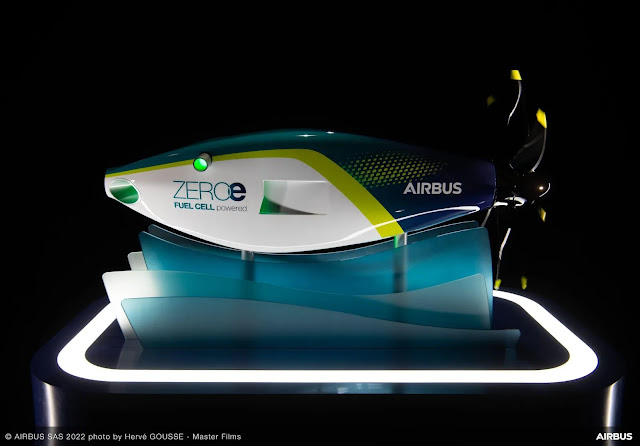
|
| During its annual summit, Airbus unveiled this zero-emission hydrogen-powered aircraft engine [Courtesy: Airbus]. |
Airbus made a number of announcements today to further its global push toward lower emissions and increased sustainability in commercial aviation. Among its almost-notable achievements are the development of a zero-emission hydrogen fuel cell engine and a collaboration with fuel producer Neste to accelerate the implementation of sustainable aviation fuel, or SAF.
The announcements were made, along with others, at this year's Airbus Summit, which is being held today and tomorrow in Toulouse, France.
Airbus has announced that "towards the end of the decade," it will conduct a demonstration flight of the A380 equipped with a fuel cell engine. This flight will be called ZEROe. The plane, according to the group, has been upgraded to transport liquid hydrogen fuel cells.
Glenn Llewellyn, Airbus's vice president of zero-emission aircraft, stated, "Fuel cells are a potential solution to assist us reach our zip-emission ambition," and the company is "focused on developing and testing this engineering science to sympathize if it is feasible in addition to feasible for a nil-emission aircraft entry-into-service in 2035."
According to Airbus, fuel cell engines have the potential to power a 100-seat aircraft with a range of 1,000 nautical miles. Airbus has stated that it intends to introduce a ZEROe aircraft "in the 2027-2028 timeframe," and that its electric current testing will provide options for the design of this future aircraft.
Airbus also announced the signing of an agreement with Neste to promote the development and widespread adoption of SAF in the aviation industry. The companies "share a vision that SAF is critical to reducing greenhouse gas emissions from air locomotion," according to the statement. We can accelerate the adoption of SAF in the aviation industry if we work together."
Neste and Airbus announced a new agreement that will allow them to collaborate to accelerate the production and use of SAF while also pursuing commercial opportunities and cutting-edge fuel engineering science. According to Airbus and Neste, "investigating how '100% SAF' function tin live enabled" is a top priority.
Airbus has announced that all of its aircraft are currently certified to fly with up to 50% SAF blend. Neste believes their collaboration will be "critical to achieving certification for up to 100 percent SAF by the end of the decade."
At the Summit, Airbus also debuted its DisruptiveLab, a lab housed entirely within a helicopter and designed to test technologies aimed at reducing carbon dioxide emissions in the helicopter industry. The partnership has announced that the lab will "evaluate a new aerodynamic architecture aimed at reducing fuel consumption, while also pursuing the implementation of hybridization alongside a fully parallel hybrid propulsion organization that allows the battery to live recharged in-flight."
According to Airbus, the helicopter prototype will begin test flights by the end of this year (2022).

